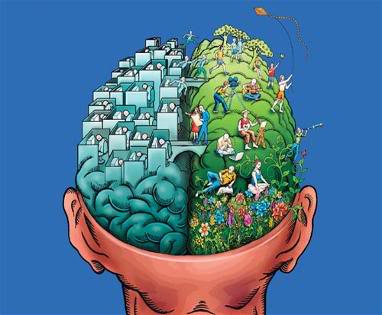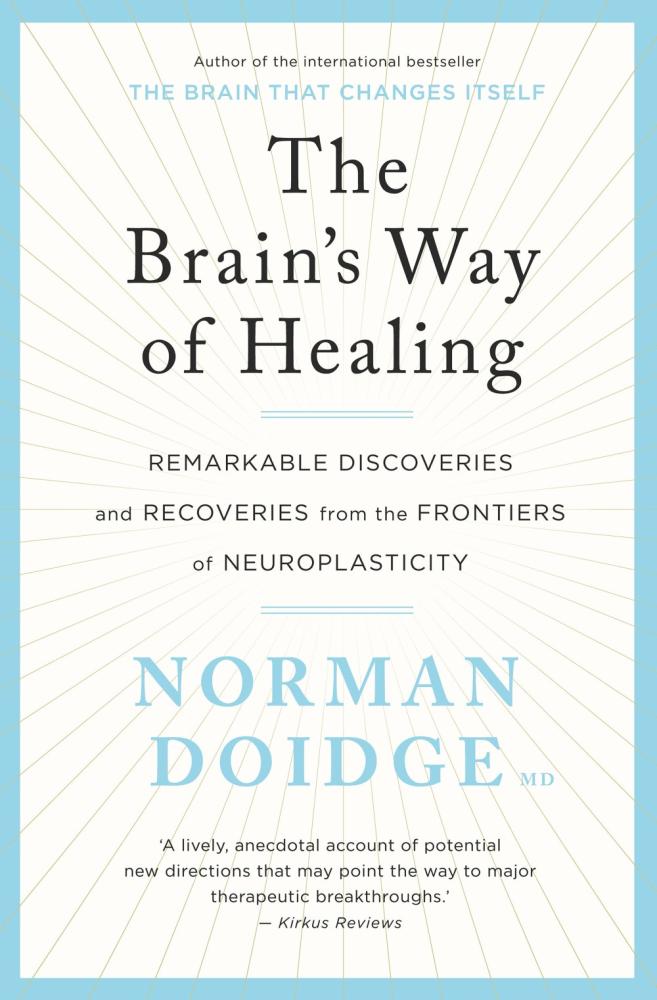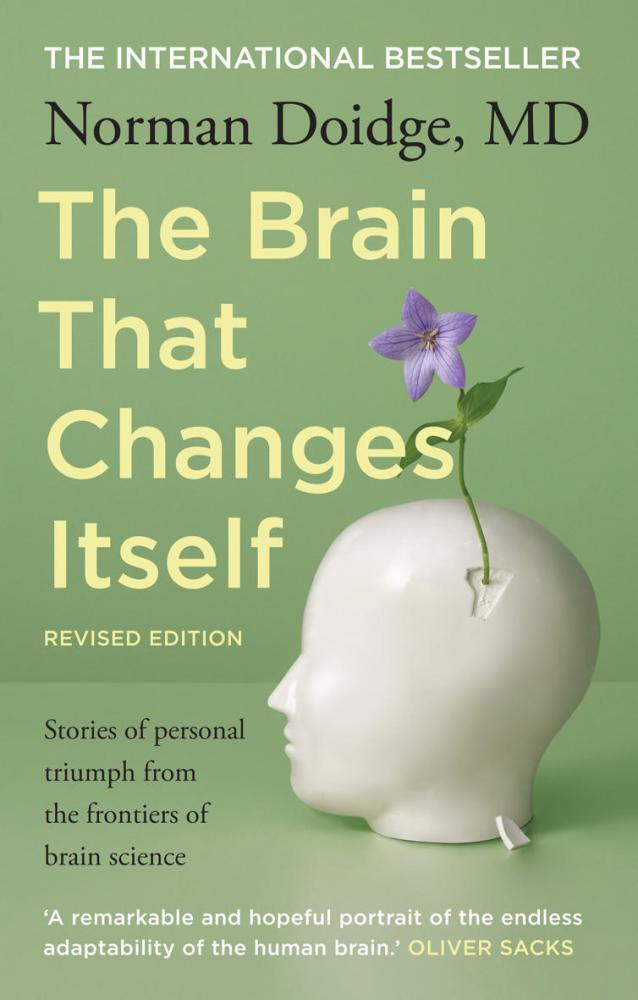Norman Doidge: Why Two Brains?

Two Brains Are Better Than One
By Norman Doidge, M.D.
Why do we have two different brain hemispheres? And what difference does understanding this make in our lives and in how we treat patients?
A huge difference it turns out. Our different hemispheres have two different attitudes to the world around us, and greet and process the world in a different way, and both are utterly necessary for survival, and a flourishing life. There are two of you taking in the world at once, but you are not conscious of this activity. The right hemisphere evolved to deal with novelty, anomaly, the new, exploration, reading emotions and processing individuality; the other to deal with routine, the already known, narrow focus, and more abstract thought and categories. Two things commonly interfere with the hemispheres being in healthy balance.
One is psychological trauma, which hugely disrupts the right hemisphere’s capacity to process our emotions, and link us to our bodies. In traumatic dissociation, the right hemisphere is partially offline, as it is in certain states of self-fragmentation.
But aspects of modern life and activities, such as the modern workplace, and our computer technologies, are now also neuroplastically exaggerating and reinforcing left hemisphere functioning, at the expense of the right. This, in turn exacerbates many of the problems and pathologies we treat, especially in young people whose brains are still developing. This leftward shift is also one of the reasons adults feel battered, wired, and often treat themselves like, or are treated like, machines, and often feel devitalized, and out of touch with feelings, and meaning in their lives.
At Norman Doidge’s forthcoming Byron Clinic 2018 workshops, you will learn how to understand and spot these hemispheric differences, and their relationship to psychiatric diagnosis, psychological trauma and how to use this understanding to optimize treatment.
Learn about left vs. right hemispheric approaches in psychotherapy, how to decide what your patient needs, and how the two hemispheres access our plasticity in slightly different ways, and how to restore the balance between the two hemispheres, so your patients are using both their brains to get better.
Norman Doidge in Australia

Weaving neuroscience, evolution, psychotherapy, psychology, psychiatry, neurology, great literature, and anthropological findings, along with original films of people undergoing neuroplastic change, this workshop will update the attendee on the latest neuroplastic developments, reinforce basics, and teach principles on how to help oneself, and one’s patients, when caught in rigid patterns, to grow out of that rigidity, and make use of their neuroplastic potential. It will also provide attendees with new information about how to preserve their brain plasticity.
The brain is a far more open system than we ever imagined, and nature has gone very far to help us perceive and take in the world around us. It has given us a brain that survives in a changing world by changing itself.
Norman Doidge, M.D.
The Power of Thought: Updates in Brain Plasticity
Join acclaimed researcher Norman Doidge as he explores the latest research into the brain’s amazing capacity to heal, and how to apply these discoveries to clinical practice.
Brisbane, Sydney, Melbourne: May 2018
Find Out MoreAfter the initial critical learning period of youth is over, the areas of the brain that need to be ‘turned on’ to allow enhanced, long lasting learning can only be activated when something important, surprising, or novel occurs, or if we make the effort to pay close attention.
Norman Doidge, M.D.
The Power of Thought:
Updates in Brain Plasticity
Brisbane, Sydney, Melbourne: May 2018
Norman Doidge
Norman Doidge, M.D., is a psychiatrist, psychoanalyst, researcher, author, essayist and poet. He is on faculty at the University of Toronto’s Department of Psychiatry, and Research Faculty at Columbia University’s Center for Psychoanalytic Training and Research, in New York. He is the author of two New York Times Bestsellers. He lives in Toronto.
He is a professor of psychiatry at Boston University School of Medicine, medical director of the Trauma Center in Boston, and co-director of the Complex Trauma Treatment Network, NCTSN.
He is the author of more than 150 peer reviewed scientific articles and several books including the New York Times best-seller The Body Keeps the Score: Mind, Brain, and Body in the Healing of Trauma.
Weaving neuroscience, evolution, psychotherapy, psychology, psychiatry, neurology, great literature, and anthropological findings, with original films of people undergoing neuroplastic change, this workshop will update the attendee on the latest neuroplastic developments, reinforce basics, and teach principles on how to help oneself, and one’s patients, when caught in rigid patterns, to grow out of that rigidity, and make use of their neuroplastic potential. It will also provide attendees with new information about how to preserve their brain plasticity.

The Brain’s Way of Healing is a stunner — the sort of book you want to read several times, not because it is difficult to understand, but because it opens up so many novel and startling avenues into our potential to heal. Norman Doidge enthrals us with a rich combination of lucidly explained brain research and pioneering … approaches to recovery. With an eloquence reminiscent of Oliver Sacks, Doidge bolsters the latest advances in brain science with a series of extraordinary case histories of people for whom all hope seemed to be lost, but who healed as a result of great personal courage, and by changing the ways their bodies and brains processed sensations and movement. This hopeful book demonstrates that a variety of sensory inputs — light, sound, electricity, vibration, movement, and thought —can awaken the brain’s attention processors, and thereby allow even the most afflicted to (re)gain ownership of their lives.
Only a few decades ago, scientists considered the brain to be fixed or ‘hardwired’ and considered most forms of brain damage, therefore, to be incurable. Dr. Doidge, an eminent psychiatrist and researcher, was struck by how his patients’ own transformations belied this and set out to explore the new science of neuroplasticity by interviewing both scientific pioneers in neuroscience, and patients who have benefited fromneurorehabilitation. Here he describes in fascinating personal narratives how the brain, far from being fixed, has remarkable powers of changing its own structure and compensating for even the most challenging neurological conditions. Doidge’s book is a remarkable and hopeful portrait of the endless adaptability of the human brain.

wisemind.com: mental health freedom
Psychologists and Psychiatrists with 6 to 10 years’ university study and over 5000 hours working face to face with people just like you. Sessions from Bessel van der Kolk, Janina Fisher, Pat Ogden.
Norman Doidge in Australia

Weaving neuroscience, evolution, psychotherapy, psychology, psychiatry, neurology, great literature, and anthropological findings, along with original films of people undergoing neuroplastic change, this workshop will update the attendee on the latest neuroplastic developments, reinforce basics, and teach principles on how to help oneself, and one’s patients, when caught in rigid patterns, to grow out of that rigidity, and make use of their neuroplastic potential. It will also provide attendees with new information about how to preserve their brain plasticity.












